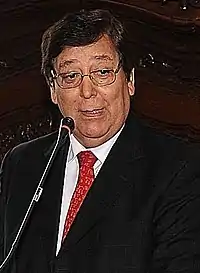Enrique Bernales Ballesteros
Enrique Martín Bernales Ballesteros (6 November 1940, in Lima – 24 November 2018)[1] was a Peruvian scholar and politician. He was a member of the Peruvian Senate and the first UN Special Rapporteur on mercenaries.

Bernales Ballesteros served as Principal Professor of Social Sciences at the Pontificia Universidad Católica del Perú (PUCP).[2] He also served as the general secretary of the Revolutionary Socialist Party (PSR).[2][3]
Childhood and academic career
Bernales Ballesteros was the son of Luis E. Bernales (director of Colegio Guadalupe) and Laura Ballesteros.[2][4] Whilst his family was relatively wealthy, he grew up in the Barrios Altos.[4] He went to school at Colegio La Salle for his primary and secondary education. He studied Law at PUCP and Political Science at the University of Grenoble.[2][5] During his three years as a student in Europe, he was molded in socialist thought.[4] He obtained a degree in Political Science and a doctorate in Law.[2] In 1971 he was elected Dean of the Political Science faculty at PUCP. In 1975 he studied Methodology of Historical Investigation at universities in Paris, London and Madrid.[5]
Senator
He was elected as a senator, standing as a United Left (IU) candidate.[2] In the 1985 election he was elected with 111,808 votes.[6] At the time, he was called the 'Gentleman of the Peruvian Left'. He led the left-wing faction in parliament.[4]
Special Rapporteur
Between 1987 and 2004 he served as the UN Special Rapporteur on the question of the use of mercenaries.[7][8] He was the first person to hold this post. In 2004 he was replaced by Shaista Shameem, who adopted a more conciliatory approach to the private security industry that Bernales Ballesteros. The post was abolished the following year.[9] As of 1996 he was the chairman of the United Nations Human Rights Committee.[10]
Bibliography
- El Parlamento en el Perú (1968)
- Autores Políticos de la Integración Andina (1972)
- Movimientos Sociales-Movimientos Universitarios (1974)
- La Reforma Educativa y la Mecánica de la Dominación Interna (1975)
- Reforma Universitaria (1976)
- Modernización y Expansión de la Educación Universitaria (1977)
- La Universidad en el Perú: Balance y Perspectiva (1978)
- Burguesía y Estado Liberal (1979)
- Constitución y Sociedad Política (1980-1984)
- El Desarrollo de las Ciencias Sociales en el Perú (1981)
- Parlamento Sociedad y Democracia (1982)
- El Parlamento por Dentro (1992)
- Crisis Politica, solución electoral? (1980)
References
- Enrique Bernales Ballesteros falleció a los 78 años (in Spanish)
- Mario Guimarey; Martín Garay Seminario (1986). Quién es quién: Congreso de la República, 1985-1990. MGS & MGS Editores. p. 205.
- Víctor Manuel Quechua (1994). Perú, 13 años de oprobio: terrorismo internacional. V.M. Quechua. p. 4.
- Martín Garay Seminario (1985). Perfiles humanos: los hombres que hacen historia en el Perú. M. Garay Seminario. p. 129.
- Enrique Bernales B. (1 January 1986). El Camino Español de la Democracia. Instituto de Cooperación Iberoamericana, Ediciones Cultura Hispánica. p. 210. ISBN 978-84-7232-408-4.
- Fernando Tuesta Soldevilla (1986). Perú 1985: el derrotero de una nueva elección. Centro de Investigación de la Universidad del Pacifico / Fundación Friedrich Ebert. p. 58.
- Professor B S Chimni; Miyoshi Masahiro; Li-Ann Thio (20 April 2009). Asian Yearbook of International Law: Volume 13 (2007). Routledge. p. 89. ISBN 978-1-134-03021-7.
- Sarah Percy (21 August 2013). Regulating the Private Security Industry. Routledge. p. 44. ISBN 978-1-134-97433-7.
- Simon Chesterman; Chia Lehnardt (12 July 2007). From Mercenaries to Market: The Rise and Regulation of Private Military Companies. Oxford University Press. p. 24. ISBN 978-0-19-922848-5.
- Inter-American Commission on Human Right (1 June 1999). Inter-American Yearbook on Human Rights / Anuario Interamericano De Derechos Humanos. Martinus Nijhoff Publishers. p. 2338. ISBN 90-411-1208-1.
- Magali Arellano (1992). Quién es quién? 1992. Peru Reporting E.I.R.L. p. 88.